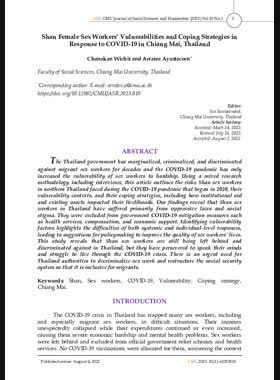Shan Female Sex Workers’ Vulnerabilities and Coping Strategies in Response to COVID-19 in Chiang Mai, Thailand
Publication Description
The Thailand government has marginalized, criminalized, and discriminated against migrant sex workers for decades and the COVID-19 pandemic has only increased the vulnerability of sex workers to hardship. Using a mixed research methodology including interviews, this article outlines the risks Shan sex workers in northern Thailand faced during the COVID-19 pandemic that began in 2020, their vulnerability contexts, and their coping strategies, including how institutional aid and existing assets impacted their livelihoods. Our findings reveal that Shan sex workers in Thailand have suffered primarily from oppressive laws and social stigma. They were excluded from government COVID-19 mitigation measures such as health services, compensation, and economic support. Identifying vulnerability factors highlights the difficulties of both systemic and individual-level responses, leading to suggestions for policymaking to improve the quality of sex workers’ lives. This study reveals that Shan sex workers are still being left behind and discriminated against in Thailand, but they have persevered to speak their minds and struggle to live through the COVID-19 crisis. There is an urgent need for Thailand authorities to decriminalize sex work and restructure the social security system so that it is inclusive for migrants.

